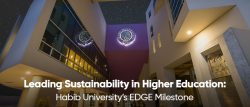The latest episode of Habib University’s “Breaking the Story” reflects on the 6th Yohsin Lecture “Bullet Dodged or Merely Delayed: Reflections on the Future of Democracy, Nuclear Proliferation and the Looming Environmental Catastrophe in a Post-Trumpian World”, delivered by the renowned intellectual and learned scholar, Dr. Noam Chomsky and debates on the issues of, “Declining Global Democracy, Governance & Public Disengagement”. The Podcast was conducted on Friday, October 08, 2021.
The panel comprised Mr. Owais Tohid, senior print and broadcast journalist, Mr. Raza Rumi, an anchor, journalist, editor, policy expert and writer and Ms. Asma Shirazi, a Pakistani journalist, anchor and political commentator.
The podcast was hosted by Ms. Aqsa Junejo, Assistant Director Marketing & Communication, Habib University along with Mr. Zulqurnain Ul Haq, Lecturer, Habib University.
This episode highlighted issues such as restrictions on freedom of speech, scarcity of credible information, biasedness of media, polarity of wealth, use of social media platforms and educating and equipping youth for the future. The episode also discussed the significance, impact and role of media in establishing democracy and highlighted the issues that were being faced by the media in doing so.
With 24 years of journalistic experience, Mr. Owais Tohid, who has headed three of Pakistan’s private television channels, agreed that Media and Democracy go hand in hand media is one of the strongest mediums that can help retain democracy.
Mr. Tohid put the importance of asking questions as the fundamental attribute to enable one to understand the world around them and exercise individual agency. This also resonates well with the youth in Pakistan who will be at the forefront of shaping Pakistan’s future.
He explained that it is a mix and match of different factors that have led to the “backsliding” of Democracy. “Media alone cannot stand against that tide, neither can media absorb it all”.
Mr. Tohid discussed the struggles of media and media personnel in the past, which helped democracy prevail. He stated, “The struggle now is not unified but individual.”
On a question about dissemination of information, he said, “Censorship of media is now state-owned as well as corporate-owned. The transition of state-owned media to corporate-owned media has led to the media being biased and controlled.”
Mr. Raza Rumi, along with Pakistan, discussed the condition of democracy in United States, Europe and Turkey. He provided valuable analysis on how false narrative can be used as a powerful tool by influential groups to dictate and even alter the political outcomes and associations of consumers of media.
On the question on public disengagement and role of media Mr. Rumi said, “Credible information is people’s right and not a favor. They cannot take the right decision unless provided credible information.”
While discussing about inequality of power and wealth, Mr. Rumi highlighted the issue of wealth concentration in a few hands, which has proven to be a significant hindrance to democracy. “The disparity of wealth in the West at the moment is far more than what it was back in the start of the 20th century. Democracy cannot prevail when wealth is distributed in such a manner and such is the case in Pakistan as well,” he explained.
He appreciated the efforts of Mr. Tohid and Ms. Shirazi, who have always stood their ground, fought for truth and faced defiance and powerful opposition in doing so.
Ms. Shirazi highlighted how the shadows of fascism and authoritarianism are taking the garb of legality and constitutionalism and hovering over democracy around the world today are the biggest threats to democratic manifestation one can imagine.
When asked about the current state of democracy, Ms. Shirazi said, “It is not only Pakistan facing a declining democracy, rather, this is a global phenomenon. Democracy depends on many factors which include; free media, freedom of expression, human rights and its protection, these are all pillars of democracy, which have been weakened. The biggest barrier in the way of democracy is fascism and authoritarianism, which now is prevailing throughout the world.”
The panel agreed that backsliding of democracy is evident and is not only a national issue but a global dilemma.
Discussing the importance of social media platforms and how the platforms are being used by general public to express their view points, the panelists deemed social media platforms as the leading means of public engagement of this era. They said that the new generation are far more self-aware and are adept at leveraging social media to organize around issues critical to them. It would take a while to grasp the concept of meaningful engagement but it is now up to the new generation to develop and take the country forward.
Mr. Rumi on explaining the causes of public disengagement said, “Every nation in the world allows campus politics, it is only in Pakistan where campus politics is condemned.” He added, “All the political parties alike, have been in denial and unable to play their part in boosting and supporting democracy.”
Mr. Tohid seconded his opinion and said, “Student unions should be opened, political involvement of the students can be denied, but their political thinking should not be capped.”
Ms. Shirazi strongly stressed over the fact that speaking up and standing up for one self is very essential, saying, “Having the right to speak up is what matters the most, be it wrong, be it right, one should at least have the freedom of speech.”
The podcast concluded with hope for the future of journalism and democracy when the attention was directed towards Maria Ressa and Dmitri Muratov, who got a Nobel Prize for Journalism on the same day as the podcast.
Mr. Tohid, optimistic for the future said, “Perhaps there is still hope for Journalism, this is the first time in my life, I have seen a journalist being awarded a Nobel Prize.”




